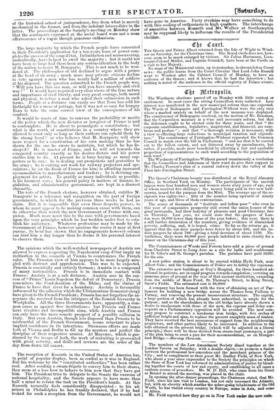The opinions which the well-watched newspapers of Austria are allowed
to express respecting the Napoleonist coup d'etat imply an inclination in the councils at Vienna to countenance the French ruler. The Prussian view of him appears to be more largely min- gled with distrust and apprehension. This was to be expected. Prussia is essentially and entirely German ; Austria is a compound of many nationalities. Prussia is in immediate contact with France ; Austria is at a safe distance. Austria sees in the suc- cess of "Prince" LouisNapoleon the defeat of Democracy; Prussia remembers the Confederation of the Rhine, and the claims of France to have that river for a boundary. Austria is favourably influenced by the adhesion which the Ultramontane Romanist clergy have given to the French President; Prussia has not forgotten the an- noyance she received from the intrigues of the Roraish hierarchy in Westphalia. All the three Governments have, apparently, a com- mon cause as against free institutions ; but Prussia and France have rivalries and incompatible aims, while Austria and France can only have the more remote prospect of a possible collision in Italy. But even Austria, though less disposed than Prussia to be mistrustful of the French Government, seems reluctant to place implicit confidence in its intentions. Strenuous efforts are made both at Vienna and Berlin to fill up the musters and perfect the discipline of their respective armies. At Mayence, which is gar- risoned by the troops of both, the work of recruiting is prosecuted with great activity, and drills and reviews are the order of the day from dawn till sunset.


























 Previous page
Previous page